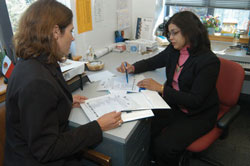As a part of the Department of Political Science and Sociology, the University’s Public Policy graduate program provides students with the opportunity to advance their knowledge in this particular field of government and law from both inside and outside the classroom.
This 30 credit program is one that prepares students for careers in policy analysis and public service, according to the University’s website. Courses such as Policy Analysis, Research Methods, Research Design and Theory, and Policy and Ethics “offer the foundations for students interested in understanding, framing, and analyzing policy,” said Stephen Chapman, Director of the Public Policy program at the University.
A practicum course is also required for those enrolled in the program, meaning that it is necessary for students to participate in real-world policy settings outside of the classroom in order to earn their degree.
“This not only builds a student’s resume for employment following graduation, but it gives them hands-on experience in a policy-related position,” commented Chapman.
“I really enjoy all of the classes that I take because I get to either understand the policy process a little more or I get to learn some practical, analytical tools for doing work in the policy area,” said Susan Pagano, a current Public Policy student at the University.
She is currently taking classes that focus on theory, ethics, political analysis, and research methods.
As a former undergraduate student who earned her degree in political science at the University, Pagano is grateful for all of the professors in the department. “They really make all of the material interesting and engaging.”
With hopes of one day attending law school, Nicole Sandelier, another current Public Policy student who completed her undergraduate studies at the University, also praised the professors who have taught her everything she knows.
“The faculty in my department are amazing individuals with whom I wanted to continue studying with and ultimately mirror my career after. I admire their professional careers and feel comfortable confiding in them as I begin my professional journey.”
With a faculty comprised of nationally recognized scholars and highly experienced public policy professionals, according to the University’s website, students benefit greatly from their experiences in the classroom.
Professors offer a mix of both theory and practice in their lessons and curriculums, which allows students to become familiar with all sides of public policy. This has the potential to turn them into more well-rounded and sought-after job candidates.
“Many of my students work on application projects during the weeks we do not meet as a class,” explained Chapman. “This offers students practical knowledge in the classroom, while also requiring them to apply that knowledge on a regular basis.”
Chapman also pointed out that the program has a hybrid structure, which allows students to simultaneously broaden their perspective while also balancing a career or family. This makes it easy for many older individuals to come back to school to earn their Master’s Degree in Public Policy, as well as young adults who just graduated with their Bachelor’s.
There are about 40 students at various stages of the Public Policy graduate program, and many of them are either interested in or already working with local and state governments, non-profit organizations, or interest groups, among a number of other career fields.
Chris Orlando, an alum of the Public Policy program at the University, is currently working as the Director of Social Media and Constituent Relations for a member of the New Jersey Legislature. Orlando sees this position as a great opportunity to grow and learn, especially because it allows him to experience the ins and outs of the legislative process first hand.
He claims that the program at the University was the best springboard he could have asked for. “The Monmouth Public Policy program is very versatile. There is a little focus on everything and if there is a topic you’d like to study, the staff will find a way for that to happen,” Orlando added.
Students involved in the Public Policy program are able to work closely with the University’s Polling Institute, which “was established to be a leading center for the study of public opinion on important state and national issues,” according to their official website.
In fact, “E-Government in New Jersey” is a research project between the Public Policy program and the Polling Institute that includes students in the examination of how NJ municipalities use their websites to communicate with citizens.
“The research skills students gain are applicable far beyond the policy world,” said Chapman. “Students are introduced to employing quantitative analyses in order to provide evidence for particular policies or problems in society.”
Whether students are interested in working in the world of non-profits or within the realm of their local government, the University’s Public Policy graduate program will give them the skills and the confidence that it takes to attain the career that they desire.
“I believe students who attend Monmouth’s Public Policy program are offered a dynamic view of the policy world in general, the opportunity to specialize in a particular policy field through electives or independent studies, and the quantitative research skills that will set them aside from other candidates in the job market,” said Chapman.
IMAGE TAKEN from monmouth.edu




